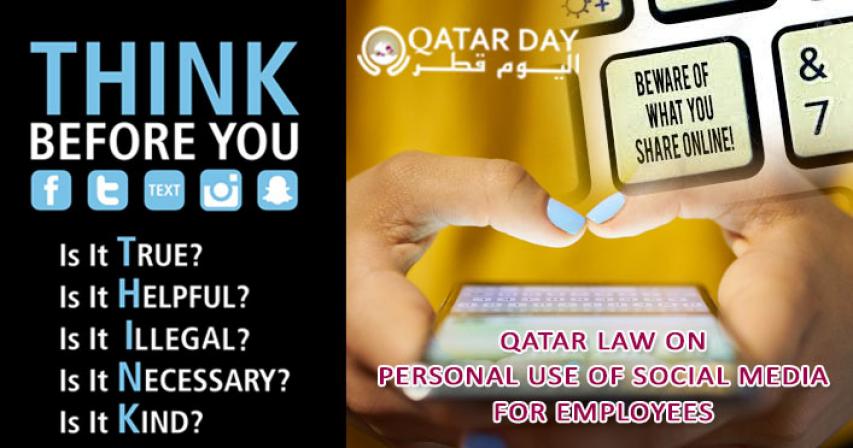Are you working in Qatar and active on social media? Beware of these policies
- 4 years ago

Outlined below are general guidelines for employee engagement with social media provided by the Ministry of Information and Communications Technology here.
Note: These guidelines will evolve as technology continues to make possible new ways for social networking.
Personal Use of Social Media
If an employee uses social media in personal capacity, they should be mindful of the following:
1.The employee should never disclose any information that is confidential or proprietary to their employer or any third party (e.g. companies, individuals and other government agencies) that has disclosed information to the Agency in confidence. They should never comment on anything related to legal or commercial matters such as regulatory matters, the status of tenders and employment contracts. Employee’s existing employment contract should also be prohibiting this.
2.The employee should keep in mind that what they publish will be widely accessible. For example, his or her supervisor and colleagues may come across what is being communicated online through their own use of social media. So, the employee should think about what they are saying and be responsible.
3. If the employee identifies himself as an employee of the Agency, they should make it clear that the views expressed are theirs alone and should not use the Agency’s logo or other means that may cause the audience to believe that they are representing the Agency’s views. The employee may use the following declaration as an example: The views expressed on this (e.g. blog; website...) are my own and do not necessarily reflect the views of
4. The employee should not infringe on the privacy rights of colleagues, such as by posting pictures of colleagues or giving out their contact details without their permission.
5. Personal use of social media should be done at an employee's personal time.
Professional use of Social Media on behalf of the Agency
When it comes to using social media professionally (e.g. as part of the Agency’s awareness campaign, interactive on-line discussions with external peers and contacts, or when representing the Agency in particular on-line forums), these basic guidelines should be followed:
1.The employee should disclose who they are and their role at the Agency. The employee should not pretend to be someone they are not.
2.The employee should try and understand the culture of the online communities they communicate with so as to interact effectively.
3.The employee should protect their own privacy and respect the privacy and contact preferences of others.
4.The employee should write about what they know and their areas of expertise. If the employee is not an expert on a particular topic that comes up for discussion, they should make this clear to others. The employee can also suggest how to get in touch with someone else in the Agency who has expertise in a given topic area if appropriate and after the proposed expert’s permission. They should not comment on any matter which may have legal or commercial implications for any third party.
5. Where practicable, links to the Agency’s website should be provided so that individuals and on-line communities have access to official statements, documents and initiatives.
6. The employee should engage in healthy debate and not use social media to criticize or denigrate colleagues or individuals, agencies and companies that the Agency employs and/or collaborates with. When disagreeing with others’ opinions, the employee should keep it appropriate and polite. They should choose words wisely and be careful and considerate.
7.The employee should be accountable by quickly and clearly correcting any mistakes they may make in presenting information related to the Agency’s work and initiatives. For example, if they choose to modify an earlier post to a blog, readers should clearly be informed that they have done so.
8.The employee should take a few minutes to think about what he or she is going to say before actually saying it. He or she may also want to consult his or her manager if he or she is unsure how to respond to a particular issue that is being discussed. The employee is the author, and responsible for anything that is published, so they should use good judgment.
9. The employees should not create additional social media accounts of the Agency.All official social media accounts should be created and administered by the e-Participation Leader or the personnel assigned with the responsibilities of online communications in the Agency.
10. Departments in the Agency seeking to market their activities in social media or who want to start a blog/create pages/accounts should channel it through the e-Participation Leader.
11.If the employee comes across in social media comments regarding Department level programs or the Agency in general, he or she should keep the e-Participation Leader informed.
Use of electronic means and online communication channels for people-government communication offers ease of use, convenience of time and location, transparency and people’s trust, and reduction in governance cost.
Therefore, governments internationally and regionally are adopting such means and communication channels to encourage people’s participation in governance, which has aptly grown to be known as e-Participation.
The objective of e-Participation istoengagepeoplein development policy and decision-making processes through use of information and communication technologies. e-Participation is an important index in major global e-Government rankings such as UN-e-Government Survey and WEF-Global IT Report (GITR).
Qatar currently ranks 45thin the UN e-Participation Index 2014. As per findings of a UN e-Government Assessment Mission conducted in 2011, the culture of e-Participation is still lacking in many institutions and people in Qatar.
One of the objectives of ictQATAR is to improve e-Participation between government agencies and the citizens, residents and communities ofQatar (hereinafter collectively referred to as “people”).
Source: iCTQatar
Comments